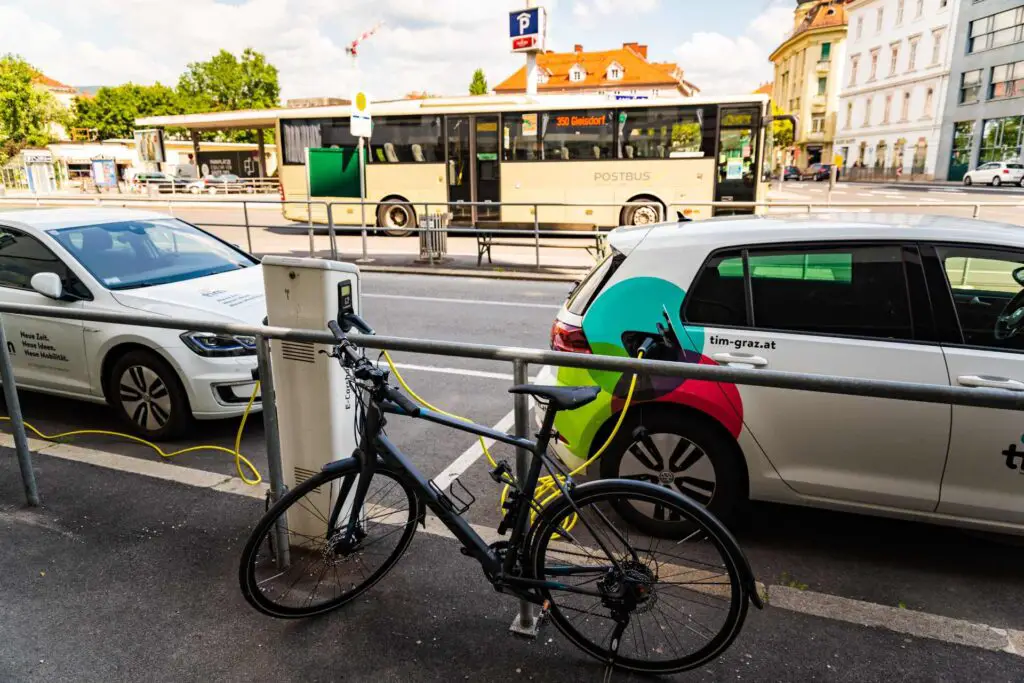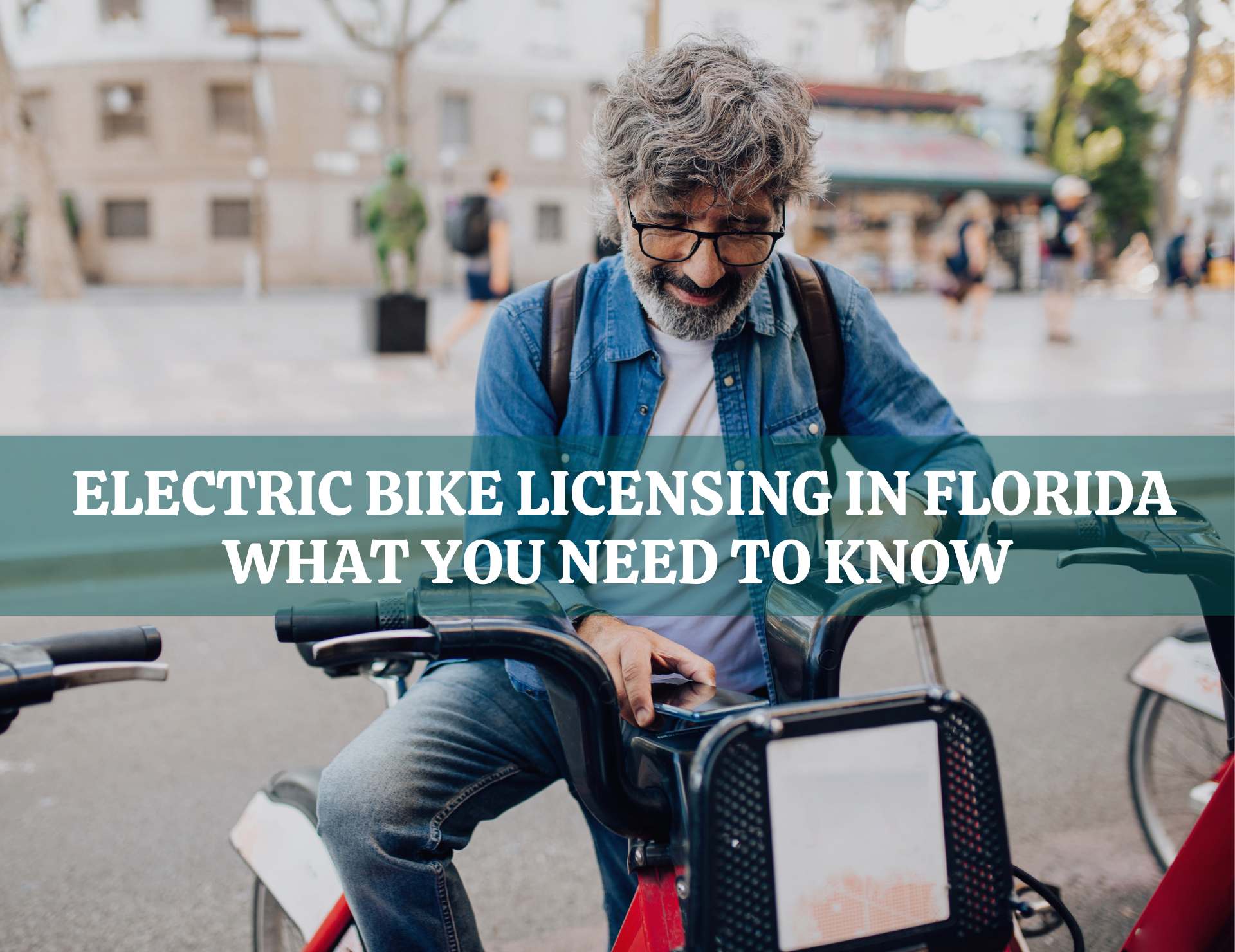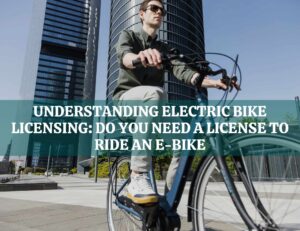In this article, we delve into the regulations and requirements surrounding the licensing of electric bike riders in Florida. From understanding the types of electric bikes to knowing who needs a license, we cover everything you need to know about riding legally in the Sunshine State.
What are Electric Bikes in Florida?
Electric bikes, or e-bikes, are bicycles equipped with an electric motor that assists with propulsion. In Florida, these bikes are classified into three categories based on their maximum speed capabilities. Class 1 e-bikes have pedal-assist features, while Class 2 e-bikes have throttle-assist, and Class 3 e-bikes offer pedal-assist up to higher speeds. Understanding these distinctions is crucial as they impact where you can ride and whether a license is required.
In Florida, the legal definition of an electric bicycle aligns with federal regulations, defining them as bicycles with fully operable pedals and an electric motor of less than 750 watts, among other specifications. This classification is essential for determining licensing requirements.
Do You Need a License to Ride an Electric Bike in Florida?

Fortunately for riders, Florida does not require a special license to operate electric bikes. Since e-bikes are considered bicycles as long as they meet the state’s criteria, riders do not need a driver’s license, motorcycle license, or any special certification to use them on public roads or bike paths. This makes e-bikes accessible to a wide range of individuals looking for alternative and eco-friendly transportation options.
However, it’s crucial to note that riders must follow traffic laws applicable to bicycles, including speed limits, signaling, and right-of-way rules. Additionally, wearing a helmet is highly recommended, especially for riders under 16 years old, as it is mandatory for them to wear helmets while operating e-bikes in Florida.
What are the laws around helmets in Florida?
In Florida, helmet laws for electric bike riders are designed to enhance safety, especially for younger riders. It is mandatory for all riders under the age of 16 to wear a helmet when operating any class of electric bike. The helmet must meet the federal safety standards specified by the Consumer Product Safety Commission (CPSC). Although there are no helmet requirements for riders 16 and older, wearing a helmet is highly recommended for all ages to reduce the risk of head injuries in case of accidents. These regulations are part of Florida’s broader commitment to bicycle safety, emphasizing the importance of protective gear to ensure a safer riding environment for everyone.
What are the rules for riding on the road in Florida?

When riding an electric bike on the road in Florida, e-bike users must adhere to the same traffic laws and regulations that apply to traditional bicycles. This includes obeying all traffic signals and signs, riding in the same direction as traffic, and using proper hand signals when turning or stopping. Riders must yield to pedestrians at crosswalks and give an audible signal before overtaking and passing them.
E-bikes should be ridden in bike lanes when available, and when not, riders should stay as close to the right-hand side of the road as practicable, except when making a left turn, avoiding hazards, or when the lane is too narrow for a bicycle and a vehicle to travel safely side by side. Additionally, riding on sidewalks is generally prohibited unless local ordinances specifically allow it. These rules ensure that e-bike riders contribute to a safe and orderly traffic environment while enjoying their ride.
Do you need a license, insurance or registration in Florida?
In Florida, riding an electric bike does not require a special license, insurance, or vehicle registration. As long as the e-bike meets the state’s criteria—having fully operable pedals and an electric motor of less than 750 watts—riders are exempt from the licensing and registration requirements that apply to motor vehicles and motorcycles. This makes electric bikes an accessible and convenient mode of transportation for a wide range of individuals.
However, while insurance is not legally required, it is recommended to consider personal liability insurance to cover potential accidents or damages. By eliminating the need for a license, insurance, and registration, Florida encourages the use of electric bikes as an eco-friendly and efficient transportation option.
Are Electric Bikes Legal in Florida State Parks?

Yes, electric bikes are generally legal in Florida state parks, but their use is subject to specific regulations and restrictions to ensure the safety and enjoyment of all park visitors. E-bike riders must adhere to the same rules as traditional bicycles, which typically include staying on designated bike paths and trails, obeying posted speed limits, and yielding to pedestrians and other trail users. However, the allowance of e-bikes can vary by park, and some parks may have additional restrictions based on the class of e-bike or specific trail conditions.
It’s essential for riders to check with individual state park regulations before bringing an electric bike to ensure compliance and avoid fines. By following these guidelines, e-bike enthusiasts can enjoy the natural beauty of Florida’s state parks responsibly.
Where Can You Ride Electric Bikes in Florida?
Electric bikes are permitted in many of the same areas where traditional bicycles are allowed. This includes bike lanes, paths, and roads designated for bicycle use. Florida law prohibits e-bikes from operating on sidewalks unless local ordinances specifically permit it. Riders should familiarize themselves with local regulations to ensure compliance and a safe riding experience.
When riding on roadways, e-bike users must adhere to traffic laws applicable to bicycles. This includes obeying traffic signals, yielding to pedestrians, and using proper hand signals for turning and stopping. By understanding and following these rules, riders can enjoy the convenience and benefits of electric bikes while ensuring safety for themselves and others.
Conclusion:
In conclusion, riding an electric bike in Florida is an accessible and convenient option, as no special license, insurance, or vehicle registration is required. However, riders must adhere to specific criteria regarding the type and operation of their e-bikes. While there are no age restrictions for Class 1 and Class 2 e-bikes, Class 3 e-bike riders must be at least 16 years old, and all riders under 16 must wear helmets.
E-bike users must follow traffic laws applicable to bicycles, such as obeying traffic signals, using hand signals, and riding in designated bike lanes. Additionally, while e-bikes are permitted in many Florida state parks, riders should check individual park regulations for specific rules and restrictions. By understanding and following these regulations, electric bike enthusiasts can enjoy the benefits of eco-friendly transportation while ensuring their safety and the safety of others.
FAQs:
Are there age restrictions for riding electric bikes in Florida?
Yes, riders under 16 years old must wear helmets while operating e-bikes in Florida. However, there are no specific age restrictions for riding e-bikes, as long as riders comply with safety regulations.
Can I modify my e-bike to increase its speed beyond the legal limit?
Modifying an e-bike to exceed legal speed limits is not advisable and may lead to legal consequences. It’s essential to use e-bikes within their designated specifications for safety and legal compliance.
Do I need insurance for my electric bike in Florida?
Insurance is not mandatory for e-bikes in Florida, as they are considered bicycles under state law. However, some riders may choose to purchase insurance for added protection in case of accidents or theft.
Can I ride my electric bike in state parks or nature reserves?
Each park or reserve may have its own regulations regarding e-bike usage. It’s crucial to check with park authorities or review posted signs to determine where e-bikes are permitted within these areas.
Do I need to register my electric bike with the state of Florida?
No, e-bikes do not require registration with the state of Florida, as they are considered bicycles. However, riders should ensure their e-bikes meet state criteria and are operated responsibly.
Are there speed limits for electric bikes in Florida?
Yes, electric bikes in Florida must comply with posted speed limits on roads and paths where bicycles are allowed. Exceeding these limits can result in legal consequences and jeopardize rider safety.










